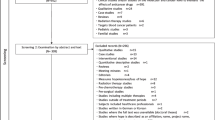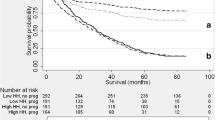Abstract
Purpose
Psychological responses to cancer are widely believed to affect survival. We investigated associations between hope, optimism, anxiety, depression, health utility and survival in patients starting first-line chemotherapy for metastatic colorectal cancer.
Methods
Four hundred twenty-nine subjects with metastatic colorectal cancer in a randomised controlled trial of chemotherapy completed baseline questionnaires assessing the following: hopefulness, optimism, anxiety and depression and health utility. Hazard ratios (HRs) and P values were calculated with Cox models for overall survival (OS) and progression-free survival (PFS) in univariable and multivariable analyses.
Results
Median follow-up was 31 months. Univariable analyses showed that OS was associated negatively with depression (HR 2.04, P < 0.001) and positively with health utility (HR 0.56, P < 0.001) and hopefulness (HR 0.75, P = 0.013). In multivariable analysis, OS was also associated negatively with depression (HR 1.72, P < 0.001) and positively with health utility (HR 0.73, P = 0.014), but not with optimism, anxiety or hopefulness. PFS was not associated with hope, optimism, anxiety or depression in any analyses.
Conclusions
Depression and health utility, but not optimism, hope or anxiety, were associated with survival after controlling for known prognostic factors in patients with advanced colorectal cancer. Further research is required to understand the nature of the relationship between depression and survival. If a causal mechanism is identified, this may lead to interventional possibilities.
Similar content being viewed by others
References
Grenon NN, Chan J (2009) Managing toxicities associated with colorectal cancer chemotherapy and targeted therapy: a new guide for nurses. Clin J Oncol Nurs 13:285–296
Arndt V, Merx H, Stegmaier C, et al. (2006) Restrictions in quality of life in colorectal cancer patients over three years after diagnosis: a population based study. Eur J Cancer 42:1848–1857
Schofield PE, Juraskova I, Butow PN (2003) How oncologists discuss complementary therapy use with their patients: an audio-tape audit. Support Care Cancer 11:348–355
Coyne JC, Tennen H (2010) Positive psychology in cancer care: bad science, exaggerated claims, and unproven medicine. Ann Behav Med 39:16–26
Carver CS, Pozo-Kaderman C, Harris SD, et al (1994) Optimism versus pessimism predicts the quality of women’s adjustment to early stage breast cancer. Cancer 73:1213–1220
Daneault S, Dion D, Sicotte C, et al (2010) Hope and noncurative chemotherapies: which affects the other? J Clin Oncol 28:2310–2313
Snyder CR, Sympson SC, Ybasco FC, et al (1996) Development and validation of the State Hope Scale. J Pers Soc Psychol 70:321–335
Meyerhardt JA, Giovannucci EL, Holmes MD, et al (2006) Physical activity and survival after colorectal cancer diagnosis. J Clin Oncol 24:3527–3534
Tebbutt NC, Wilson K, Gebski VJ, et al (2010) Capecitabine, bevacizumab, and mitomycin in first-line treatment of metastatic colorectal cancer: results of the Australasian Gastrointestinal Trials Group Randomized Phase III MAX Study. J Clin Oncol 28:3191–3198
Scheier MF, Carver CS, Bridges MW (1994) Distinguishing optimism from neuroticism (and trait anxiety, self-mastery, and self-esteem): a reevaluation of the Life Orientation Test. J Pers Soc Psychol 67:1063–1078
Zigmond AS, Snaith RP (1983) The hospital anxiety and depression scale. Acta Psychiatr Scand 67:361–370
Rabin R, de Charro F (2001) EQ-5D: a measure of health status from the EuroQol Group. Ann Med 33:337–343
Therasse P, Arbuck SG, Eisenhauer EA, et al (2000) New guidelines to evaluate the response to treatment in solid tumors. European Organization for Research and Treatment of Cancer, National Cancer Institute of the United States, National Cancer Institute of Canada. J Natl Cancer Inst 92:205–216
Chida Y, Hamer M, Wardle J, et al (2008) Do stress-related psychosocial factors contribute to cancer incidence and survival? Nat Clin Pract Oncol 5:466–475
Quinten C, Coens C, Mauer M, et al (2009) Baseline quality of life as a prognostic indicator of survival: a meta-analysis of individual patient data from EORTC clinical trials. Lancet Oncol 10:865–871
Satin JR, Linden W, Phillips MJ (2009) Depression as a predictor of disease progression and mortality in cancer patients: a meta-analysis. Cancer 115:5349–5361
Vigano A, Donaldson N, Higginson IJ, et al (2004) Quality of life and survival prediction in terminal cancer patients: a multicenter study. Cancer 101:1090–1098
Coyne JC, Ranchor AV, Palmer SC (2010) Meta-analysis of stress-related factors in cancer. Nat Rev Clin Oncol 7
Petticrew M, Bell R, Hunter D (2002) Influence of psychological coping on survival and recurrence in people with cancer: systematic review. BMJ 325:1066
Efficace F, Bottomley A, Coens C, et al: Does a patient’s self-reported health-related quality of life predict survival beyond key biomedical data in advanced colorectal cancer? Eur J Cancer 2006; 42: 42-9
Maisey NR, Norman A, Watson M, et al (2002) Baseline quality of life predicts survival in patients with advanced colorectal cancer. Eur J Cancer 38:1351–1357
Schofield P, Ball D, Smith JG, et al (2004) Optimism and survival in lung carcinoma patients. Cancer 100:1276–1282
Schulz R, Bookwala J, Knapp JE, et al (1996) Pessimism, age, and cancer mortality. Psychol Aging 11:304–309
Butow PN, Coates AS, Dunn SM (1999) Psychosocial predictors of survival in metastatic melanoma. J Clin Oncol 17:2256–2263
Faller H, Bulzebruck H, Drings P, et al (1999) Coping, distress, and survival among patients with lung cancer. Arch Gen Psychiatry 56:756–762
Allison PJ, Guichard C, Fung K, et al (2003) Dispositional optimism predicts survival status 1 year after diagnosis in head and neck cancer patients. J Clin Oncol 21:543–548
APA (1994) Diagnostic and Statistical Manual of Mental Disorders (DSM-IV) (ed 4th Edition). American Psychiatric Press, Washington
Coyne JC, Stefanek M, Palmer SC (2007) Psychotherapy and survival in cancer: the conflict between hope and evidence. Psychol Bull 133:367–394
McCorkle R, Strumpf NE, Nuamah IF, et al (2000) A specialized home care intervention improves survival among older post-surgical cancer patients. J Am Geriatr Soc 48:1707–1713
Richardson JL, Zarnegar Z, Bisno B, et al (1990) Psychosocial status at initiation of cancer treatment and survival. J Psychosom Res 34:189–201
Fisch MJ, Loehrer PJ, Kristeller J, et al (2003) Fluoxetine versus placebo in advanced cancer outpatients: a double-blinded trial of the Hoosier Oncology Group. J Clin Oncol 21:1937–1943
Stockler MR, O’Connell R, Nowak AK, et al (2007) Effect of sertraline on symptoms and survival in patients with advanced cancer, but without major depression: a placebo-controlled double-blind randomised trial. Lancet Oncol 8:603–612
Acknowledgments
The MAX trial is an Australasian Gastro-Intestinal Trials Group (AGITG) study: Clinical trial registration number ACTRN12605000025639. Assoc. Prof. Schofield is supported by National Health and Medical Research Council Research Fellowship (CDA Level 2). This work was supported by an unrestricted educational grant from Roche Products Pty Ltd., Australia, and an additional unrestricted educational grant from Roche Products Ltd., UK.
Conflict of interest
None of the authors has any conflict of interest with respect to this study. The study sponsors had no involvement in any aspect of the conduct of this research. The authors had full control of all primary data and agree to allow the journal to review the data if requested.
Author information
Authors and Affiliations
Corresponding author
Electronic supplementary material
Supplementary Figure 1
(DOCX 48 kb)
Rights and permissions
About this article
Cite this article
Schofield, P.E., Stockler, M.R., Zannino, D. et al. Hope, optimism and survival in a randomised trial of chemotherapy for metastatic colorectal cancer. Support Care Cancer 24, 401–408 (2016). https://doi.org/10.1007/s00520-015-2792-8
Received:
Accepted:
Published:
Issue Date:
DOI: https://doi.org/10.1007/s00520-015-2792-8




